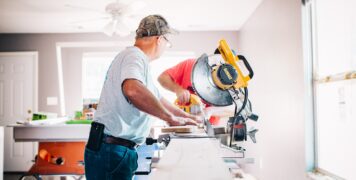Contact
020 4515 6728
info@ccameron.co.uk
Charles Cameron & Associates
Blackfriars Foundry
154-156 Blackfriars Road
London SE1 8EN
First-time buyer deposits
February 10, 2023
Information published was correct at the time of writing
How much will you need to put down to secure your first home?

WHETHER YOU ARE thinking about saving for your first home or you have been saving for a while now, the deposit will most likely be the first hurdle on your property journey. You may also be wondering if a larger deposit can reduce the amount of your mortgage repayments. While this is certainly true in some cases, it depends on several factors that will influence the size of your loan and repayment terms. Generally, you will need a minimum deposit in the region of between 5% to 10% of the cost of the property you would like to buy. This figure depends on whether you’re buying alone, in which case you can split the deposit in half. It also depends on current market activity at the time of the purchase.
SECURING A LOWER MONTHLY MORTGAGE INTEREST RATE
Saving above a 10% deposit may give you more options for the home you want, expand your choices on the market and potentially secure you a lower monthly mortgage interest rate. When you are applying for a mortgage, lenders will take into account both your credit score and the loan-to-value (LTV) ratio when determining what rate they’ll offer. The LTV ratio is calculated by dividing the loan amount by the value of the property. Generally speaking, lenders prefer borrowers with higher credit scores and smaller LTV ratios because these indicate lower risk for them.
AVERAGE DEPOSIT PAID BY A SOLE FIRST-TIME BUYER
Therefore, having a larger deposit could result in a lower interest rate, which may lead to lower monthly mortgage payments. The average deposit paid by a sole first-time buyer in 2021 was £61,100, a figure which fell significantly from £71,400 in 2020, according to first-time buyer data[1]. The data also shows that the average income of a first-time buyer buying solo has risen from £45,900 in 2019 to £50,300 in 2020, and to £50,800 in 2021. Additionally, over half of those surveyed (56%) said they wouldn’t have been able to get on the property ladder without family support. It may seem daunting to save for a deposit on your first home, but there ways that can help you reach your goal. Firstly, make sure you know exactly what size of deposit will be required based on the property you want buy. This will help you to plan realistically and build up the necessary funds. Looking into government schemes could also provide you with access to additional funding support options. Secondly, start saving early! Begin by creating a budget that limits your spending and sets aside money for savings each month. This could include reducing lifestyle expenses or cutting back on unnecessary costs, such as a gym membership or other subscriptions. You should also think about setting up a direct debit to deposit money into a savings account or an Individual Savings Account (ISA) each month. Thirdly, look into alternative sources of income to support your savings journey. This could include taking on additional hours at work, freelancing and so forth. Increasing your income will enable you to save more for your deposit more quickly.
HELP FOR FIRST-TIME BUYERS
If you are in a situation where you can only save a small deposit, or you do not have the option to split the cost in half with a secondary resident, there are a range of government schemes available to give you a helping hand onto the property ladder.
Options include:
Lifetime Individual Savings Account (LISA) – You can use a LISA to buy your first home or save for later life. You must be aged between 18 and 39 to open a LISA. You can put away up to £4,000 each year and the government will add a 25% bonus to your savings. However, there is a penalty for taking money out of a LISA if you are not putting it towards a deposit, or withdrawing after age 60.
Equity Loan – This scheme is only available to first-time buyers in England who want to buy a ‘new-build’ house within the relevant regional price cap. You can borrow up to 20% (40% in London) of the purchase as an interest-free equity loan. You do not pay interest on the equity loan for the first five years, but you will start to pay interest in year six. The equity loan payments are interest only, so you do not reduce the amount you owe.
Shared ownership – Shared ownership offers first-time buyers the option to buy a share of the home from the landlord, who is usually the council or a housing association, and pay a reduced rent on the remaining share. Later, you can choose to buy a bigger share in the property and ‘staircase’ up to 100% of its value. Some of these schemes are ending or unavailable in certain locations, so it is important to thoroughly research each one and save as much as possible for your deposit.
Don’t forget, our professional, friendly advisers are on hand to support you and can help you explore all of your options.
Source data: [1] Barclays Mortgages’ First Time Buyer Index 07 March 2022.



